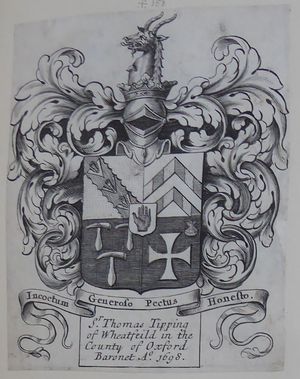Difference between revisions of "Thomas Tipping 1653-1718"
m (→Sources) |
|||
| (2 intermediate revisions by the same user not shown) | |||
| Line 3: | Line 3: | ||
[[file:P1120420(4).JPG|thumb|Tipping's bookplate (British Museum Franks Collection *158)]] | [[file:P1120420(4).JPG|thumb|Tipping's bookplate (British Museum Franks Collection *158)]] | ||
====Biographical Note==== | ====Biographical Note==== | ||
| − | Son of Sir [[family::Thomas Tipping]] of [[location::Wheatfield, Oxfordshire]]. Matriculated at [[education::Trinity College, Oxford]] 1669, but did not graduate; admitted at [[organisations::Lincolns Inn]] 1672. [[occupation::MP]] for [[location::Oxfordshire]] 1685, for [[location::Wallingford]] 1689-98 | + | Son of Sir [[family::Thomas Tipping]] of [[location::Wheatfield, Oxfordshire]]. Matriculated at [[education::Trinity College, Oxford]] 1669, but did not graduate; admitted at [[organisations::Lincolns Inn]] 1672. [[occupation::MP]] for [[location::Oxfordshire]] 1685, for [[location::Wallingford]] 1689-98. He was a [[occupation::JP]] for Oxfordshire, and held other local administrative offices. He drew prominence for promoting a proviso to the bill for preserving James II’s person, which would allow clergymen to critique the Roman Catholic Church. In 1686, Tipping fled to [[location::Holland]] and was outlawed following his efforts to marry his ward, [[associates::Silverlock]], to a woman of ill repute. He was listed as being opposed to the King in 1687-88 and returned with William of Orange’s invasion fleet in 1688. He was made a baronet in 1698. He got into financial difficulties towards the end of his life, and died in a debtors' prison. The Wheatfield estate was sold in 1727. |
====Books==== | ====Books==== | ||
| Line 12: | Line 12: | ||
*[https://www.historyofparliamentonline.org/volume/1660-1690/member/tipping-thomas-1653-1718 History of Parliament]. | *[https://www.historyofparliamentonline.org/volume/1660-1690/member/tipping-thomas-1653-1718 History of Parliament]. | ||
*Gambier Howe, E. R. J. ''Franks bequest: catalogue of British and American book plates bequeathed to the ... British Museum''. London, 1903-4. | *Gambier Howe, E. R. J. ''Franks bequest: catalogue of British and American book plates bequeathed to the ... British Museum''. London, 1903-4. | ||
| + | *Information from Naomi Hart. | ||
| + | *Information from Vanessa Wright. | ||
</div> | </div> | ||
Latest revision as of 04:27, 25 August 2022
Sir Thomas TIPPING, 1st baronet 1653-1718
Biographical Note
Son of Sir Thomas Tipping of Wheatfield, Oxfordshire. Matriculated at Trinity College, Oxford 1669, but did not graduate; admitted at Lincolns Inn 1672. MP for Oxfordshire 1685, for Wallingford 1689-98. He was a JP for Oxfordshire, and held other local administrative offices. He drew prominence for promoting a proviso to the bill for preserving James II’s person, which would allow clergymen to critique the Roman Catholic Church. In 1686, Tipping fled to Holland and was outlawed following his efforts to marry his ward, Silverlock, to a woman of ill repute. He was listed as being opposed to the King in 1687-88 and returned with William of Orange’s invasion fleet in 1688. He was made a baronet in 1698. He got into financial difficulties towards the end of his life, and died in a debtors' prison. The Wheatfield estate was sold in 1727.
Books
Tipping used an engraved armorial bookplate, dated 1698, and probably commissioned around the time he was given his baronetcy (Franks *158). The extent and disposition of his library are not known. His younger brother George (b.1655/6), who became a barrister, also used a slightly re-engraved version of the bookplate (Franks *276).
Sources
- History of Parliament.
- Gambier Howe, E. R. J. Franks bequest: catalogue of British and American book plates bequeathed to the ... British Museum. London, 1903-4.
- Information from Naomi Hart.
- Information from Vanessa Wright.
